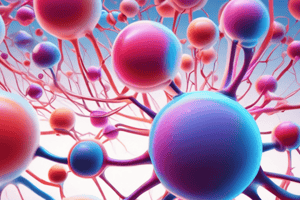Podcast
Questions and Answers
What is the primary role of extracellular fluid (ECF) in maintaining cellular function?
What is the primary role of extracellular fluid (ECF) in maintaining cellular function?
- ECF is responsible for DNA replication.
- ECF generates ATP for cellular energy.
- ECF helps in the synthesis of proteins.
- ECF acts as a medium for transporting nutrients and waste. (correct)
Which of the following best describes the relationship between extracellular fluid and intracellular fluid?
Which of the following best describes the relationship between extracellular fluid and intracellular fluid?
- They depend on each other for pH balancing.
- Movement of water between ECF and ICF is controlled by osmotic forces. (correct)
- They are entirely independent of each other.
- They only interact during cellular metabolism.
What role does electrolyte balance in ECF play in acid-base balance?
What role does electrolyte balance in ECF play in acid-base balance?
- Electrolyte balance stabilizes muscle contraction.
- Electrolyte balance affects oxygen transport in the blood.
- Electrolyte balance has no effect on acid-base balance.
- Proper electrolyte levels are critical for maintaining pH levels. (correct)
Which electrolyte is primarily involved in maintaining the resting membrane potential of cells?
Which electrolyte is primarily involved in maintaining the resting membrane potential of cells?
Which process is mainly responsible for acid-base balance in the body?
Which process is mainly responsible for acid-base balance in the body?
What is a potential consequence of an imbalance in ECF electrolytes?
What is a potential consequence of an imbalance in ECF electrolytes?
How does the body primarily compensate for an acidosis condition?
How does the body primarily compensate for an acidosis condition?
What is the primary function of buffering systems in maintaining acid-base balance?
What is the primary function of buffering systems in maintaining acid-base balance?
Which part of the nervous system is responsible for voluntary muscle movements?
Which part of the nervous system is responsible for voluntary muscle movements?
What is the primary role of the Autonomic Nervous System?
What is the primary role of the Autonomic Nervous System?
Which component of the nervous system is considered the master control system of the body?
Which component of the nervous system is considered the master control system of the body?
What type of neurons are primarily found in the Autonomic Nervous System?
What type of neurons are primarily found in the Autonomic Nervous System?
What distinguishes the Somatic Nervous System from the Autonomic Nervous System?
What distinguishes the Somatic Nervous System from the Autonomic Nervous System?
Which system works in conjunction with the Nervous System to maintain homeostasis?
Which system works in conjunction with the Nervous System to maintain homeostasis?
Which of the following is NOT a function of the Peripheral Nervous System?
Which of the following is NOT a function of the Peripheral Nervous System?
Which statement about the Central Nervous System is accurate?
Which statement about the Central Nervous System is accurate?
Study Notes
Introduction to Pathophysiology and Cellular Basis of Disease
- Explores how diseases arise through physiological changes at the cellular level.
- Emphasizes understanding of normal cellular functions to comprehend disease mechanisms.
- Mechanisms include inflammation, infection, and genetic alterations affecting cell behavior.
Maintaining Cellular Function
- Cells rely on homeostasis for optimal functioning, adapting to internal and external changes.
- Key processes include metabolism, signal transduction, and cell communication.
- Intracellular and extracellular fluid balance is crucial for cellular activities.
Relationship between ECF and ICF
- Extracellular fluid (ECF) and intracellular fluid (ICF) maintain a dynamic equilibrium.
- ECF surrounds cells providing nutrients, while ICF facilitates metabolic processes within cells.
- Proper electrolyte distribution between ECF and ICF is vital for cell function.
ECF Electrolyte Balance
- Fluid and electrolyte balance regulates osmotic pressure and cell volume.
- Major electrolytes include sodium (important for nerve impulse transmission) and potassium (crucial for muscle function).
- Imbalance can lead to conditions such as dehydration or edema.
Acid-Base Balance
- The body maintains pH balance through buffer systems, respiratory control, and renal function.
- Normal blood pH ranges from 7.35 to 7.45, critical for enzyme function.
- Disorders like acidosis or alkalosis disrupt metabolic processes and homeostasis.
Normal Function of the Nervous System
- Nervous system comprises central nervous system (CNS) and peripheral nervous system (PNS).
- Functions include sensory perception, motor control, and homeostasis regulation.
- Neural communication relies on neurotransmitters and synaptic transmission.
Peripheral Nervous System
- Divided into somatic and autonomic nervous systems; somatic controls voluntary movement, while autonomic regulates involuntary functions.
- Autonomic nervous system further splits into sympathetic (fight-or-flight) and parasympathetic (rest-and-digest) pathways.
- Peripheral nerves connect CNS to limbs and organs, facilitating communication and reflexes.
Autonomic Nervous System
- Manages automatic body functions, including heart rate, digestion, and respiratory rate.
- Sympathetic pathways prepare body for stress, while parasympathetic restores body to resting state.
- Balance between sympathetic and parasympathetic activity is essential for homeostasis.
Endocrine System
- Comprises glands that secrete hormones, regulating various bodily functions including metabolism, growth, and reproduction.
- Hormonal signaling influences long-term physiological changes compared to the rapid responses of the nervous system.
- Major glands include pituitary, thyroid, adrenal, and pancreas, each having unique roles in homeostasis and health.
Studying That Suits You
Use AI to generate personalized quizzes and flashcards to suit your learning preferences.
Description
Test your understanding of the cellular basis of disease and how physiological changes lead to various illnesses. This quiz covers topics like homeostasis, the relationship between extracellular and intracellular fluids, and the importance of electrolyte balance in cellular functions.




